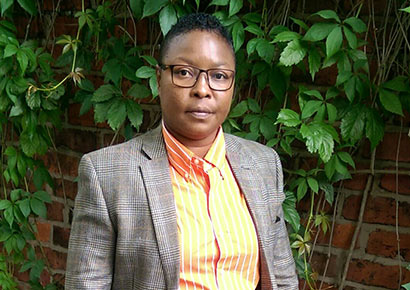LGBTQ activist gets UK asylum after dehumanising 13 year struggle

Aderonke Apata (Facebook)
After an often-humiliating legal battle lasting more than a decade, Nigerian LGBTQ activist Aderonke Apata can finally feel some stability in her life in the UK.
The Home Office this week granted Apata, 50, refugee status after years of refusing to accept that she is lesbian and faced persecution in her homeland.
“I’m extremely overwhelmed with joy and gladness to know that now I’m safe and can live freely as a human being,” she said after the decision.
Apata fled to the UK in 2004 after being arrested, tortured and extorted by the Nigerian police. Her girlfriend of 20 years was killed because of her sexuality, and after a false allegation of adultery, Apata herself was sentenced to death by stoning by a “sharia” court.
In the UK she was refused refugee status because the authorities believed she was pretending to be lesbian to stay in the country. This was despite being in a relationships with a woman, working as an LGBTQ activist, and testimonies and evidence confirming her sexuality.
Over the years, she was held in various prisons and detention centres. Apata was so desperate to prove her sexuality that in 2014 she even presented a sex tape to a court hearing her case.
“I knew we had a home video of ourselves, so I thought why not just put it in?” she said at the time. “I cannot afford to go back to my country where I will be tortured, so if I have to prove it with a sexual video, then I have to do it.”
In 2015, a judge found that, despite the tape and other evidence, Apata’s same-sex relationships and her adoption of lesbian “customs, dress and mores” were purely part of a fabrication to gain refugee status.
She and her supporters continued her fight against being deported, including launching a petition signed by over 30,000 people. Faced with a new appeal and a barrage of high profile witnesses in her support, the Home Office has now decided to grant her refugee status.
“As you rejoice with me for being safe, kindly remember that there are many people still in the same position that I was in for over 13 years,” said Apata. “I implore you all to stand with me and them to change the LGBTQ asylum application system that seeks to persecute, dehumanise and demean people each step of the process for whom they are.”
Paul Dillane, Executive Director of LGBTQ rights group Kaleidoscope Trust and a witness in Apata’s appeal, told the Thomson Reuters Foundation that her case was “an egregious miscarriage of justice”. He added that, “Seeking asylum is not a crime and LGBT people fleeing persecution must be protected under the law.”
Last month, Apata was honoured with a Pride Award by gay magazine Attitude for her work as an activist, including founding the LGBTQ refugee support organisation, African Rainbow Family.
The UK’s Home Office has been criticised in the past for the way it treats LGBTQ asylum seekers. A 2013 report revealed that some had been forced to present “photographic and video evidence of highly personal sexual activity to caseworkers, officers and the judiciary” to “prove” their sexuality.
In 2015, the UK’s Home Office announced that people seeking asylum on the basis of their sexual orientation would no longer be asked sexually explicit questions.
Leave a Reply